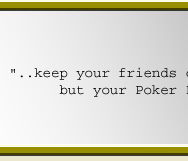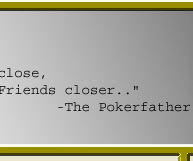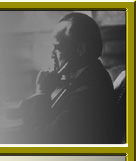(Click Here for the Latest Online Poker News Stories)
Copyright © 2006 The Motley Fool.
HEADLINE: Did Congress Kill Online Poker?
Author: Jeff Hwang
Body:
Late last Friday, Congress passed a law aimed at shutting
down online gambling in general -- including online
poker -- in the United States. Jeff Hwang makes the case that
poker isn't a form of gambling any more than buying stock is,
and it should be exempt from the new law, as horse racing and
state-run lotteries are.
I hate politics. I've never been into politics, I never will
be, and I'll tell you why.
By now, you're probably aware that late last Friday, the U.S.
Congress passed The Safe Port Act, a no-brainer bill to improve
port security. So no-brainer, in fact, that the vote went 409-to-2
in favor of the bill in the House of Representatives. But attached
to that bill was a completely unrelated set of provisions, entitled
the "Unlawful Internet Gambling Enforcement Act of 2006,"
aimed at outlawing Internet gambling -- including online
poker -- in the United States.
Mind you, this is how things get done in our country, for better
or for worse. But according to the Poker Players Alliance, more
than 70 million Americans play
poker, representing almost a quarter of the U.S. population.
Moreover, roughly one-third of poker-playing Americans play over
the Internet. In addition, the game is played legally in public
card rooms in Nevada, New Jersey, Florida, California, Washington,
Missouri, Mississippi, Iowa, Indiana, Louisiana, Michigan, South
Dakota, Michigan, etc., etc. Yet oddly, the new law -- upon its
pending signing by President Bush -- protects state-run lotteries
and horse racing from the new law, but lumps poker in with the
games of chance such as craps and roulette. Frankly, I just find
it sickening that such a controversial issue as online gambling
was handled with little, if any, debate.
Now, the new law won't actually make playing
poker online illegal; what it will do is make it illegal for
banks and credit card companies to transfer funds from U.S. customers
to online gambling sites. And by making it difficult (at the very
least) for Americans to deposit cash in online gambling accounts,
the law will significantly curb the flow of new cash into the
online poker games.
The effect is already palpable. Online gambling giants Party
Gaming and 888 Holdings -- which do roughly three-quarters and
one-half of their business, respectively, in the U.S. -- have
already announced that they will stop accepting business from
U.S.-based customers once the President signs the bill into law.
Sportingbet has announced that it will no longer pursue a merger
with World Gaming. And nearly all of the U.K.-based online gaming
companies saw their share prices more than halved in Monday trading,
while Motley Fool Hidden Gems selection Cryptologic (Nasdaq: CRYP)
-- which does less than 30% of its business in the United States
-- saw its shares drop 18%.
Legislation regarding online
gambling in the U.S. was inevitable, particularly with the
recent explosion in the growth of online poker. However, the answer
isn't prohibition.
Is poker really gambling?
First of all, the bill's specific exemption of horse racing and
state-run lotteries, but not poker, must be predicated on the
argument that poker represents a form of gambling. But is poker
really gambling?
The answer really depends on the player.
Personally, I don't think poker is all that different from buying
stocks. If you're patient and you've got a sound strategy, you're
going to beat the market in the long run. The same applies to
poker. If you trade too much and frequently speculate on trash
stocks, you are probably going to have relatively poor results
in the stock market. If you play too many hands, you're probably
going to lose at poker.
In truth, the people who call poker a game of chance either have
never played or probably just aren't very good at it. Granted,
it's also probably true that a lot of people who think they are
good at poker are, in fact, gambling.
But if you look at it that way, poker isn't gambling any more
than buying stocks is. Of course, I don't really think of the
lottery as gambling, either (It isn't gambling if you know you're
going to lose, right?). Last I checked, buying stocks online wasn't
illegal, and playing poker online shouldn't be targeted for death,
either.
As Mike McDermott said in Rounders: "Why do you think the
same five guys make it to the final table of the World Series
of Poker every year? What, are they the luckiest guys in Las Vegas?"
Prohibition is not the answer -- regulation is
In Monday's HG Daily (for Hidden Gems subscribers only) regarding
the effect of the legislation on Cryptologic, my colleague Jim
Gillies noted a lecture on Al Capone and his role during Prohibition
from a recent trip to Alcatraz:
"Prohibition's effect on alcohol prices was said to be on
the order of a 275-fold increase within a year, and almost zero
decrease in consumption of the now-illegal product. Does anyone
believe that Americans en masse will stop gambling online, especially
since there won't be any penalties for players? (Yeah, me neither.)"
Americans will continue to play online poker, albeit at a reduced
rate (Americans still have brick-and-mortar card rooms to turn
to). But that's not what the U.S. government should be concerned
about; in my opinion, the real issue is that U.S. citizens account
for the bulk of the $13 billion worldwide online gaming industry,
yet the U.S. government receives zero tax dollars. And it's not
because the online casino operators are nefarious thieves -- for
the most part, the publicly traded online gaming companies are
reputable businesses regulated by the respectable stock exchanges
in the U.K. The reality is that the U.S. online gaming market
is so profitable that these gaming companies would gladly share
their profits and pay taxes in the U.S. By one estimate, the U.S.
government is losing $3.3 billion in online gaming-related tax
dollars to foreign governments.
And if Americans are going to play poker online anyway, doesn't
it make more sense to legalize online gambling and regulate it,
rather than make a futile attempt to ban it?
Direct parallels
There are direct parallels to this in the domestic casino market.
In Council Bluffs, Iowa, for example -- which is located directly
across the river from Omaha -- Nebraskans deposit the bulk of
the nearly half a billion dollars in annual gaming revenues generated
by the three casinos owned by Harrah's Entertainment (NYSE: HET)
and Ameristar Casinos (Nasdaq: ASCA). While Nebraska is loath
to legalize full-blown casinos, Nebraskans are going to gamble
anyway, and it's inevitable that one day, the state will decide
that its residents might as well deposit gaming tax dollars in
Nebraska, rather than Iowa.
Similarly, rather than watch its residents spend all of their
gambling budgets in New Jersey, Pennsylvania legalized as many
as 61,000 slots at 14 locations in the state, which the state
expects to generate $3 billion in gaming revenue, more than half
of which will be paid back in taxes. Ohio faces a similar predicament,
as Penn National's (Nasdaq: PENN) Argosy Lawrenceburg -- located
in Indiana, roughly 25 miles across the state line from Cincinnati
-- is the industry's most successful riverboat casino, partly
because of the absence of real competition. The pending introduction
of slots in neighboring Pennsylvania will likely speed up gambling
legislation in Ohio, in an effort to keep gambling tax dollars
within the state.
It may be a little sad that these states are somewhat forced,
in a way, to legalize gambling, but it makes sense. What can you
really do when the propensity to gamble is as human as the propensity
to imbibe alcohol?
In my opinion, the regulation of online gaming seems to makes
a heck of a lot more sense than an attempted ban. It's just not
clear to me who this bit of legislation truly benefits, except
perhaps a number of politicians up for election in November.
Fool contributor Jeff Hwang owns shares of Ameristar Casinos.
The Fool has a disclosure policy.
Exclusive Noble
Poker Bonus: 50% up to $250
Article
downloaded from the World Wide Web on Oct 4, 2006:
http://www.fool.com/news/commentary/2006/commentary06100304.htm |
(Click Here for the Latest Online Poker News Stories)
|







